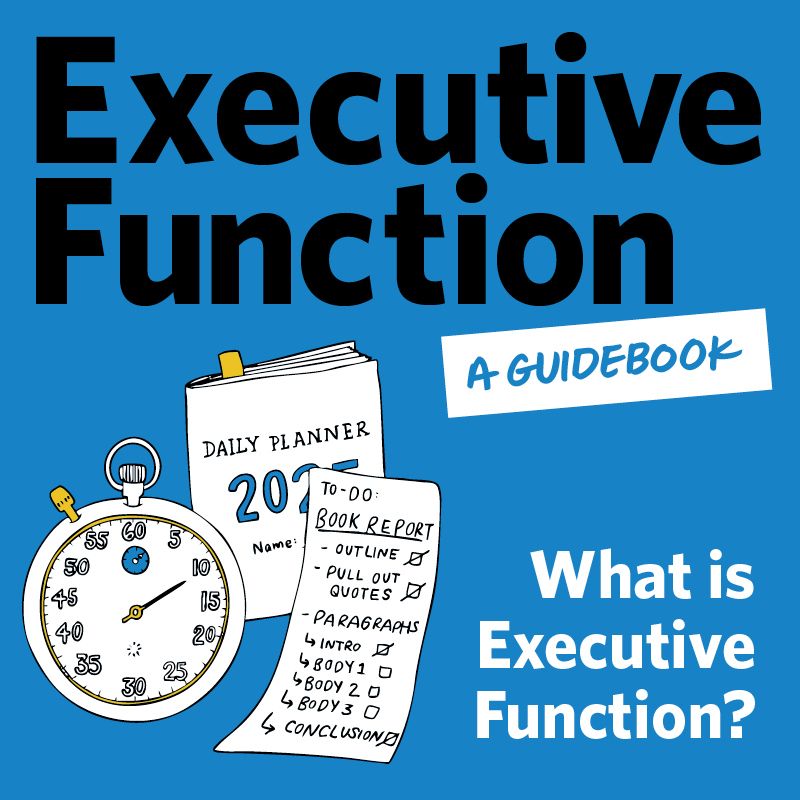- Our School
- Our Advantage
- Admission
- Elementary•Middle School
- High School
- Summer
- Giving
- Parent Resources
- For Educators
- Alumni
« Back
What is Executive Function?
May 22nd, 2025
Part 1 of Executive Function: A Guidebook

Definition: The ability to get stuff done. Executive Function (EF) is a set of mental processes that helps us manage our thoughts, actions, and emotions to achieve goals.1
Purpose: It enables us to plan, start, and finish tasks. It helps us focus, control impulses, monitor and adapt behaviors, and stay on track to get things done.2
It is the brain’s conductor, like that of an orchestra, coordinating our thoughts and emotions to guide us through complex situations and achieve a goal.3
Why Is Executive Function Important?
Strong executive function (EF) skills contribute to people’s ability to achieve goals and have healthy and happy lives. Strong executive functioning can help people do well in school, find and keep a job, and develop strong social connections. Learn more about executive function and how to develop strong EF skills in your child’s life.

Key Executive Function Processes
While not all experts view executive function the same way, the following are commonly agreed upon Executive Function processes.4

Working Memory
The ability to hold and manipulate information in our minds for short periods.
Examples:
* Following verbal multi-step instructions without needing them repeated or written down.
* Doing mental math, like calculating a tip at a restaurant.
* Remembering details of a story.
Cognitive Flexibility
The ability to problem solve by switching perspectives and adapting to new rules.
Examples:
* Switching from one task to another without getting stuck,
like play time to meal time.
* Being open to new strategies when the current approach isn’t working.
* Being able to make up a new story.
Inhibitory Control
The ability to resist impulses and distractions to stay focused.
Examples:
* Stopping yourself from blurting out in a meeting or class.
* Ignoring your phone to stay on task during work.
* Waiting for your turn.

Boosting Your Brain’s Toolbox
Think of Executive Function (EF) as your brain’s toolkit for navigating life. It’s important to sharpen our tools, learn new techniques, and get better at using each one. This is where EF skills come in—they’re the strategies and habits we can build to work with our EF.
COLD EF SKILLS: Cool executive function refers to the brain processes that help us manage our thoughts, allowing us to plan, stay organized, and solve problems logically in situations that are low-stakes.
HOT EF SKILLS: Hot executive function refers to the brain processes that help us manage our actions and emotions in situations when emotions are running high.
Organization
Arranging thoughts, materials, and activities in an orderly manner.
COOL | Practical Tips:
* Use folders or labels to categorize items.
* Break larger tasks into smaller, manageable steps.
HOT | Emotional Response:
What if I don’t know where to put things?
Is there TOO much to wade through?
Planning and Prioritizing
The ability to create a roadmap to reach a goal and decide what’s most important.
COOL | Practical Tips:
* Write down a daily or weekly to-do list.
* Identify three main tasks to focus on each day.
HOT | Emotional Response:
How can I finish if I can’t even start?
Is there anyone who can even help me?
Is it embarrassing to ask for help?
Task Initiation
The ability to start tasks without unnecessary delay.
COOL | Practical Tips:
* Set a 5-minute timer: Work on a task for just 5 minutes to build momentum.
* Create a designated workspace to signal it’s time to start.
HOT | Emotional Response:
Have I done something like this before and either not liked it or failed?
Time Management
The skill of estimating time accurately and managing it to complete tasks efficiently.
COOL | Practical Tips:
* Set timers or alarms as reminders.
* Break the day into time blocks for specific activities and reflect on whether
or not you gave yourself enough time for each.
HOT | Emotional Response:
Did I have enough time for the task?
How off was I in my time estimates?
Self-Control & Emotional Regulation
Managing emotions, thoughts, and actions to respond appropriately to situations.
COOL | Practical Tips:
* Practice deep breathing or mindfulness when feeling overwhelmed or needing to
pause before taking an action.
* Practice positive self-talk.
HOT | Emotional Response:
Are my emotions based in reality or perception?
How do I distinguish between the two?
Goal-Directed Persistence
The ability to stay focused on a goal despite challenges.
COOL | Practical Tips:
* Break large goals into smaller milestones and celebrate progress.
* Create a vision board with inspiring quotes and images.
HOT | Emotional Response:
What if the goal isn’t something I WANT to do but just something I NEED to do?

Myths and Facts
How Executive Function Skills Drive Focus, Planning, and Achievement, and Other Facts (and Myths).
MYTH: Executive function challenges aren’t real.
FACT: Executive function (EF) challenges are real and affect individuals in different ways. Although EF issues are not listed as a separate diagnosis in major diagnostic manuals like the DSM-5, they are often associated with conditions like ADHD, depression, and anxiety. EF difficulties can manifest as challenges with planning, organization, or impulse control, making them a legitimate concern for many people. 6
MYTH: Only people with ADHD have executive function issues.
FACT: While individuals with ADHD often experience EF challenges, they are not the only group affected. People without ADHD can also struggle with EF skills due to factors like trauma, stress, or mental health conditions. Weak EF skills can also be present in those with learning disabilities, anxiety, or depression. 6, 9
MYTH: Executive function skills only affect academic success.
FACT: EF skills are essential for every aspect of life, not just school or academic success. They impact how we manage daily routines, maintain relationships, regulate emotional responses, and achieve long-term personal and professional goals. Everyone, regardless of their career or educational background, uses EF skills in activities like managing time, setting goals, and regulating emotions. 7
MYTH: Kids outgrow Executive Function challenges.
FACT: EF skills continue to develop into early adulthood, but challenges do not simply disappear with age. Many adults still struggle with EF skills if they did not receive support or develop effective strategies in childhood. With consistent practice and intervention, EF skills can improve, but they don’t naturally resolve on their own. 6, 7
Citations
1. What Is Executive Function? Landmark Outreach. (2024, September)
2. Newhall, P.W. (2014). Executive Function: Foundations for Teaching and Learning. Landmark School Outreach Program.
3. Brown, T.E. (2007). A new approach to attention deficit disorder. Educational Leadership. 64, 22-27.
4. Belsky, G. (n.d.). The 3 Areas of Executive Function. Understood.org.
5. Executive Function: Skills for Life. Cleveland Clinic. (2024, August 27).
6. Cohen, D. B. (2022, April). 7 Myths of Executive Functioning. drbarbaracohen.com. October 2024
7. Morin, A. (2022, June). 5 Common Myths About Executive Function Challenges. Understood.org. October 2024
8. Hot and Cool Executive Function Skills.(2022, November 15). Landmark Outreach. October 25, 2024,
9. Heller, C. A., & Cooper-Kahn, J. (2022, September 15). Executive Function Issues and ADHD. CHADD.
The Executive Function Guidebook was compiled by representatives from Landmark School, empowering students with reading challenges, and Landmark Outreach, PD and coaching for educators.
Executive Function: A Guidebook Blog Series
Click on each of the images below to see that blog article. Or download the entire guidebook using the form.
Download
Executive Function Guidebook
Fill out the form to see the Executive Function Guidebook as a flipbook or download the entire guidebook.


Dyslexia: A Guidebook
Check out Landmark's other Guidebook blog series on Dyslexia.

Reading: A Guidebook
Check out Landmark's other Guidebook blog series on Reading.
Posted in the category Learning.








.jpg?v=1652115432307)














